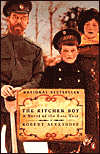
|
Christopher T. George is co-editor of Loch Raven Review. George was born in Liverpool, England in 1948 and now
lives in Baltimore, Maryland, near Johns Hopkins University, with his wife Donna and two cats. Chris works full-time as
a medical editor in Washington, DC. He has been writing and publishing poetry since he attended Loyola College,
Baltimore, and studied with Sister Maura Eichner at the College of Notre Dame, as well as with poets Elliot Coleman
and Marion Buchman. His poems have appeared in numerous publications in the United States and Great Britain. He is
also a published historian and a lyricist for a new musical,
Jack-The Musical, about Jack the Ripper.
George also is the Editor of
Desert Moon Review and an editor at
Writer’s Block Poetry Workshop.
|
Summer 2006 Table of Contents - Vol. II, No. 2 |
|
|
Christopher T. George
Robert Alexander, The Kitchen Boy: A Novel of the Last Tsar, Viking, ISBN 0-670-03178-X, 229 pages, 2003, $23.95.
The oft-told story of the last days of the Tsarist Royal family is here retold in entertaining and taut fashion by an American novelist with an intimate knowledge of Russian history and manners. Robert Alexander is the pen name of businessman Robert Zimmerman, who has studied and worked in Russia for some thirty years, most recently as a partner in a company that operates Barabu, a chain of espresso-wine bars with locations in St Petersburg. He employs the conceit of telling the story from the vantage point of little Leonka, the kitchen boy in the infamous Ipatiev House, known as “The House of Special Purpose,” in Yekaterinburg. It was in the cellar of the notorious Siberian mansion that the
Romanovs were brutally shot by Bolsheviks on the night of July 16, 1917
as a White Russian army approached with the intent of freeing them.
Alexander describes in intimate fashion – or as intimate as a servant
could – the demeaning final days of Tsar Nikolai and his consort
Aleksandra, their four daughters and son Aleksei – the hemophiliac son
and heir of Russia’s last Romanov emperor. The narrative thus explains the fact that when the remains of the Russian Royal family were recovered, two bodies were missing – the bodies of heir Aleksei and one of the Grand Duchesses, probably the second youngest, Maria (or perhaps the youngest daughter, Anastasia, who “survived” the massacre if one believes the story of the pretender Anna Anderson, portrayed by Ingrid Bergman in the 1956 film Anastasia). The fascinating story of the investigation into the remains of the Romanovs is well covered in Robert K. Massie’s The Romanovs: The Final Chapter (Random House, 1995). Massie of course earlier wrote Nicholas and Alexandra (Atheneum, 1967) made into a 1971 feature film of the same name with Michael Jayston as Tsar Nicholas II and Janet Suzman as his beloved “Alix.” Everything that author Alexander writes in The Kitchen Boy is consistent with the portrayal of the Royal family in Massie’s books, except for his speculative narrative about the kitchen boy’s role in the supposed plot to free the Romanovs and what happened to those two missing bodies, for which he provides an interesting and perhaps partly plausible explanation. Translations of the wording of the notes sent to the Romanovs during the alleged White officers’ attempt to free them are reproduced in indented type – the majority of the notes, written in French, are now in the Russian archives. The twist in the tale is that what we hear from the kitchen boy
“Leonka” – now an ailing old man living in Chicago, and fabulously
wealthy after smuggling some of the Romanov treasures out of Russia – is
not the straight scoop we are led to believe. The narrator was in “The
House of Special Purpose” and did have knowledge of the events he
describes, but he keeps mum about his true story even when making a tape
recording for his granddaughter, Kate, supposedly telling her what
happened. It remains for Kate to travel to modern-day St. Petersburg to
find out the entire truth of what occurred and of her grandfather’s role
in the tragedy. This mystery and the overall telling of the story make
for a beguiling and entertaining romance. © Christopher T. George |
|
